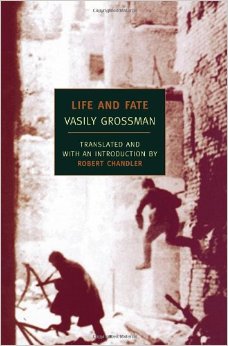
War correspondent Vasily Grossman with the Red Army in Germany.
Vasily Grossman‘s Life and Fate (New York Review Books Classics) was deemed so dangerous in the Soviet Union that not only was the manuscript confiscated – the typewriter ribbons used to type it were taken as well. As Book Haven readers know, I’ve been ploughing through the 880-page epic tale of World War II, which eloquently, powerfully, unforgettably describes the dark forces that shaped the 20th century (more here and here). It made a five-hour delay at the Denver Airport bearable, certainly by comparison with the circumstances writer and journalist Grossman describes. The author had witnessed the Battle of Stalingrad as a war correspondent, and provided the first eyewitness accounts of an extermination camp, from Treblinka.
Here’s an moving excerpt, from a conversation in a German concentration camp. The characters: Mikhail Sidorovich Mostovskoy is an Old Bolshevik, often in fierce argument with Chernetsov, a former Menshevik. Ikonnikov is a former Tolstoyan; Gardi is an Italian priest (and a “Vernichtungslager” is a German extermination camp):

Russian soldiers and inmates at Treblinka. (Photo: Yad Vashem)
Ikonnikov’s hands and face were smeared with clay. He held out some dirty sheets of paper covered in writing and said: ‘Have a look through this. Tomorrow I might be dead.’
‘All right. But why’ve you decided to leave us so suddenly?’
‘Do you know what I’ve just heard? The foundations we’ve been digging are for gas ovens. Today we began pouring the concrete.’
‘Yes,’ said Chernetsov, ‘there were rumours about that when we were laying the railway-tracks.’
He looked round. Mostovskoy thought Chernetsov must be wondering whether the men coming in from work had noticed how straightforwardly and naturally he was talking to an Old Bolshevik. He probably felt proud to be seen like this by the Italians, Norwegians, Spanish and English – and, above all, by the Russian prisoners-of-war.
‘But how can people carry on working?’ asked Ikonnikov. ‘How can we help to prepare such a horror?’
Chernetsov shrugged his shoulders. ‘Do you think we’re in England or something? Even if eight thousand people refused to work, it wouldn’t change anything. They’d be dead in less than an hour.’
 ‘No,’ said Ikonnikov. ‘I can’t. I just can’t do it.’
‘No,’ said Ikonnikov. ‘I can’t. I just can’t do it.’
‘Then that’s the end of you,’ said Mostovskoy.
‘He’s right,’ said Chernetsov. ‘This comrade knows very well what it means to attempt to instigate a strike in a country where there’s no democracy.’ …
Chernetsov’s blind, bloody pit stared at Mikhail Sidorovich Mostovskoy.
Ikonnikov reached up and grasped the bare foot of the priest sitting on the second tier of boards. ‘Que dois-je faire, mio padre?’ he asked. ‘Nous travaillons dans una Vernichtungslager.’
Gardi’s coal-black eyes looked round at the three men. ‘Tout le monde travaille là-bas. Et moi je travaille là-bas. Nous sommes des esclaves,’ he said slowly. ‘Dieu nous pardonnera.’
‘C’est son métier,” added Mostovskoy.
‘Mais ce n’est pas votre métier,’ said Gardi reproachfully.
‘But that’s just it, Mikhail Sidorovich, you too think you’re going to be forgiven,’ said Ikonnikov, hurrying to get the words out and ignoring Gardi. ‘But me – I’m not asking for absolution of sins. I don’t want to be told that it’s the people with power over us who are guilty, that we’re innocent slaves, that we’re not guilty because we’re not free. I am free! I’m building a Vernichtungslager; I have to answer to the people who’ll be gassed here. I can say “No.” There’s nothing can stop me – as long as I can find the strength to face my destruction. I will say “No!” Je dirai non, mio padre, je dirai non.’
Gardi placed his hands on Ikonnikov’s grey head.
‘Donnez-moi votre main,’ he said.
‘Now the shepherd’s going to admonish the lost sheep for his pride,’ said Chernetsov.
Mostovskoy nodded.
But rather than admonishing Ikonnikov, Gardi lifted his dirty hand to his lips and kissed it.
Tags: Vasily Grossman


June 21st, 2016 at 11:18 am
Hi Cynthia–I haven’t gone downstairs to check in my copy of L.&F., but isn’t there a typo in Gardi’s third sentence (in French): “Nous sommes des eSclaves.” Thought you’d like to know. Beautiful selection, btw. Thank you.
June 21st, 2016 at 11:43 am
Correction made. With gratitude, James.
June 24th, 2016 at 3:30 am
Mostovskoy’s quip evidently refers to the story that the Goncourts recount about Heine:
Et Baudry de conter ce joli mot de Henri Heine, à son lit de mort. Sa femme priant à ses côtés Dieu de lui pardonner, il interrompt la prière, en disant: “N’en doute pas, ma chère, il me pardonnera; c’est son métier.”
June 24th, 2016 at 6:40 am
What a terrific find, George. Thanks!